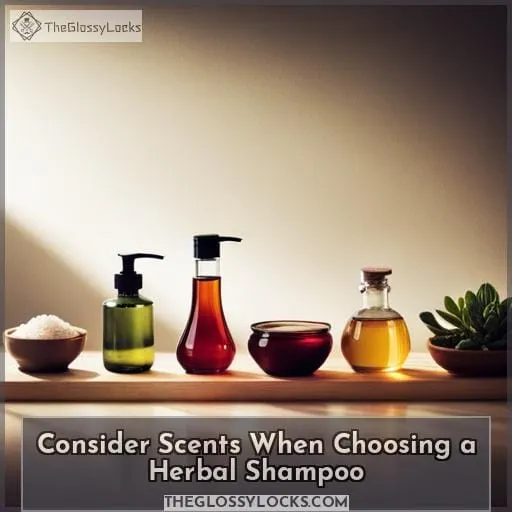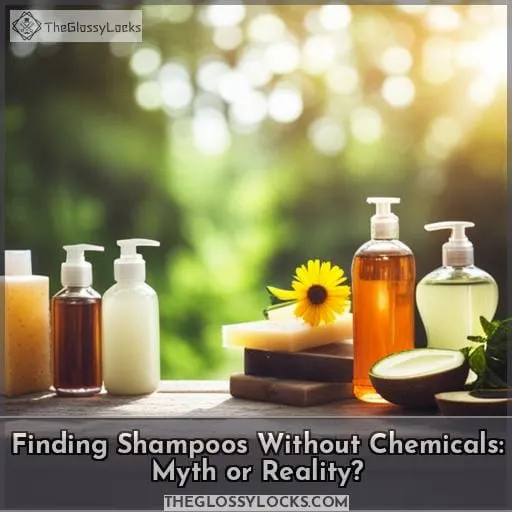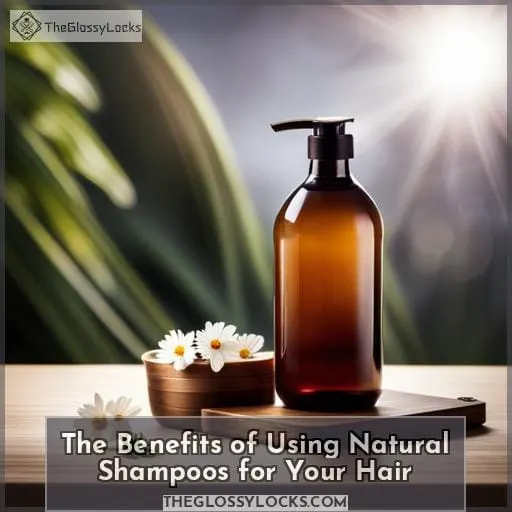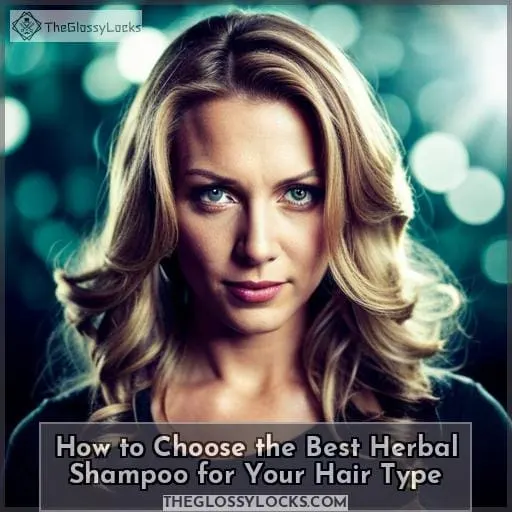This site is supported by our readers. We may earn a commission, at no cost to you, if you purchase through links.
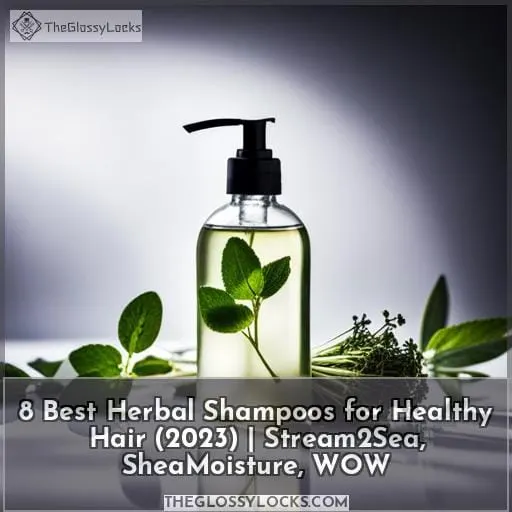 Longing for luscious locks? A herbal shampoo can help!
Longing for luscious locks? A herbal shampoo can help!
Find the best herbal shampoos for your hair type and say goodbye to dry, damaged hair.
Table Of Contents
- Key Takeaways
- 8 Best Herbal Shampoos for Healthy Hair
- Consider Scents When Choosing a Herbal Shampoo
- Finding Shampoos Without Chemicals: Myth or Reality?
- The Benefits of Using Natural Shampoos for Your Hair
- How to Choose the Best Herbal Shampoo for Your Hair Type
- Frequently Asked Questions (FAQs)
- Conclusion
Key Takeaways
- Consider the scents when choosing a herbal shampoo.
- Look for a shampoo that is made with natural ingredients.
- Avoid shampoos with sulfates and parabens.
- Choose a shampoo that is compatible with your hair type.
8 Best Herbal Shampoos for Healthy Hair
You’re looking for the best herbal shampoos for healthy hair? Look no further! These 8 shampoos are perfect for all hair types and will leave your hair feeling clean, soft, and manageable.
- Stream2Sea Outdoor Hair Care
- SheaMoisture Strengthen & Restore Shampoo
- Yuzu Pomelo Glossing Shampoo
- WOW Apple Cider Vinegar Shampoo
- Herbal Essences Shampoo & Conditioner Set
- Khadi Shikakai Shampoo
- Red Onion & Black Seed Shampoo
- Mamaearth Onion Hair Shampoo
1. Stream2Sea Outdoor Hair Care
View On Amazon
Looking for a natural and gentle shampoo that’s perfect for your outdoor adventures? Look no further than Stream2Sea Outdoor Hair Care. This 3-in-1 shampoo, conditioner, and body wash is made with natural and organic ingredients that cleanse, condition, and strengthen both hair and skin.
It’s also reef-safe, so you can enjoy your beach and camping trips without worry.
- Natural and organic ingredients
- Reef-safe
- 3-in-1 formula
- Gentle enough for daily use
- Leaves hair feeling clean, soft, and manageable
- May be too drying for some hair types
- Can be difficult to find in stores
- Relatively expensive
2. SheaMoisture Strengthen Restore Shampoo
SheaMoisture Strengthen Restore Shampoo is a sulfate-free clarifying shampoo that removes buildup and nourishes your hair with moisture. It’s perfect for damaged hair, and is formulated with Jamaican Black Castor Oil and Shea Butter to help strengthen and restore hair.
- Sulfate-free
- Clarifying
- Nourishes hair with moisture
- Perfect for damaged hair
- Formulated with Jamaican Black Castor Oil and Shea Butter
- May be drying for some hair types
- May not be strong enough for severe damage
3. Yuzu Pomelo Glossing Shampoo
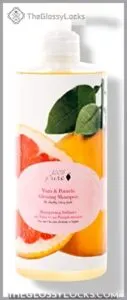
Yuzu Pomelo Glossing Shampoo is a natural and effective way to boost hair gloss and vibrancy.
- Gently breaks away buildup and impurities.
- Restores brilliant gloss and bounce to your hair.
- Enriched with illuminating citrus fruits, coconut oil, aloe, and rose hydrosol.
- Hydrates and nourishes your hair while promoting stronger, healthier locks.
- May be drying for some hair types.
- Not suitable for severe damage.
4. WOW Apple Cider Vinegar Shampoo
WOW Apple Cider Vinegar Shampoo is a gentle, sulfate-free shampoo that helps balance the pH of your hair, leaving it silkier and softer. It also nourishes the hair, reducing breakage and split ends when used regularly.
Additionally, this shampoo contains Saw palmetto, which helps combat hair loss by reducing shower-related hair fall and promotes softer, thicker hair with the help of an apple cider vinegar hair rinse.
- Silky strong nourishment
- Nourishes hair, reducing breakage and split ends
- Helps reduce hair loss
- Detox your hair and scalp
- Plant-powered ingredients
- May be drying for some hair types
- May not be suitable for severe damage
- Contains Saw palmetto
5. Herbal Essences Shampoo Conditioner Set
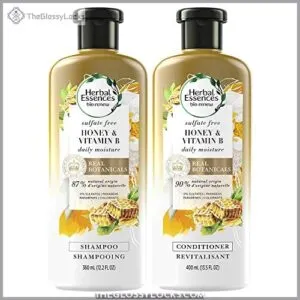
If you’re looking for a gentle, sulfate-free shampoo that’s perfect for color-treated hair, the Herbal Essences Shampoo Conditioner Set is a great option. It’s made with 87% natural origin ingredients, including real botanicals and natural source ingredients, and is safe for color-treated hair.
It also boasts the endorsement of the prestigious Royal Botanic Gardens, Kew, verifying the use of real botanicals.
- Gentle cleansing and moisturizing without sulfates
- Majority natural origin ingredients
- Endorsed by Royal Botanic Gardens, Kew
- Suitable for color-treated hair
- May be drying for some hair types
- Not as effective at removing oil and build-up as some other shampoos
- Pricey
6. Khadi Shikakai Shampoo
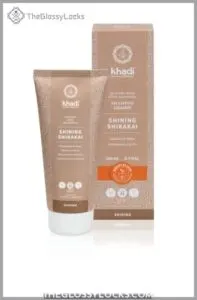
With its high active ingredients and Ayurvedic formula, Khadi Shikakai Shampoo is an excellent choice for dry, dull hair. It infuses nutrients, smoothness, and natural shine, leaving your hair feeling nourished and revitalized.
- Brilliant silkiness
- Intensive hydration
- Split end protection
- 100% natural, vegan, and cruelty-free
- Certified natural cosmetics by BDIH/COSMOS
- Hand-picked Ayurvedic medicinal herbs from small Indian farmer cooperatives
- Cultivated under the Indian sun
- May be too heavy for oily hair
- May not be strong enough for damaged hair
- Expensive
7. Red Onion Black Seed Shampoo
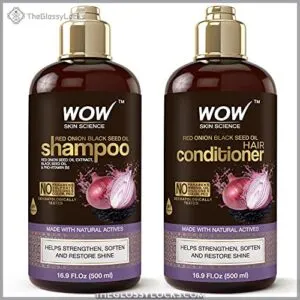
The Red Onion Black Seed Shampoo is a powerful and nourishing hair care product designed to strengthen, clarify, and detoxify your hair and scalp.
- Strengthens hair, reduces breakage, split ends, and thinning.
- Clarifies and detoxifies hair and scalp.
- Removes toxins, buildups, dirt, and dead scalp cells.
- May be drying for some hair types.
- Not suitable for severe damage.
- May not be as effective as other shampoos for some hair types.
8. Mamaearth Onion Hair Shampoo
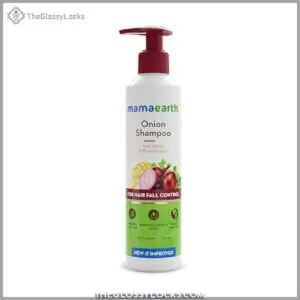
Mamaearth Onion Hair Shampoo is a revolutionary product that’s designed to tackle hair fall and promote healthy hair growth. Enriched with the goodness of Onion Oil, this shampoo stimulates the scalp and improves blood circulation, reducing hair fall significantly.
It also contains Plant Keratin, which strengthens the hair, making it frizz-free and more manageable.
- Reduces hair fall
- Strengthens hair
- Makes hair soft and smooth
- Safe for chemically treated hair
- Suitable for all hair types
- May be drying for some hair types
- May not be suitable for severe hair damage
- Contains Sulfates, Silicones, Parabens, Mineral Oil & Dyes
Consider Scents When Choosing a Herbal Shampoo
When choosing a herbal shampoo, it’s important to consider the scent as well as the ingredients.
Some scents can be more beneficial for your hair than others, so it’s important to choose one that you enjoy and that will work well with your hair type.
Aromatic considerations for shampoo
Aromatic considerations are just as important as ingredients when choosing a herbal shampoo. Subtlety and intensity are both important factors to consider, as well as your personal preference and scent memories.
Fragrance impact on hair
In addition to the benefits of herbal ingredients, the fragrance of your shampoo can also have a positive impact on your hair.
- Subtle scents can help to promote hair volume.
- Fragrances that are pleasing to you can boost your mood and make you feel more confident.
- The right scent can help to balance your hair’s pH level and promote healthy hair growth.
- Choose a shampoo with a fragrance that’s compatible with your hair type.
Scent preferences and effects
In addition to fragrance impact on hair, your scent preferences and effects also play a role in choosing the best herbal shampoo.
Whether you’re looking for a nostalgic scent, a personal scent, or something that simply smells good, there’s a herbal shampoo out there for you.
Let your sensory impact guide your decision and enjoy the benefits of healthy hair care.
Finding Shampoos Without Chemicals: Myth or Reality?
You’ve heard the horror stories about chemicals in shampoo, but are they really all that bad? The truth is, there are both natural and synthetic ingredients that can be harmful to your hair. It’s important to read the labels carefully and choose a shampoo that’s free of harmful ingredients, such as sulfates, parabens, and phthalates.
Here are 3 things to look for when choosing a shampoo without chemicals:
- Ingredients: Look for a shampoo that’s made with natural ingredients, such as aloe vera, coconut oil, and tea tree oil. These ingredients are gentle on your hair and scalp and will help to cleanse and nourish your hair without harsh chemicals.
- Sulfates: Sulfates are a common ingredient in shampoos that help to create lather. However, they can be harsh on your hair and scalp and can strip away natural oils. Look for a shampoo that’s sulfate-free.
- Parabens: Parabens are preservatives that are used in many personal care products, including shampoos. However, there’s some concern that parabens can be absorbed through the skin and may cause health problems. Look for a shampoo that’s paraben-free.
The Benefits of Using Natural Shampoos for Your Hair
Natural shampoos are a great option for people with all hair types.
They’re gentler on your hair and scalp than commercial shampoos, and they often contain ingredients that can help improve your hair health.
When choosing a natural shampoo, be sure to read the label carefully and choose one that’s free of harsh chemicals.
Natural vs. commercial shampoos
Finding shampoos without chemicals can be a challenge, but natural shampoos are a great option that are free of harsh ingredients like sulfates and parabens.
They’re also better for your hair and the environment.
Benefits of herbal ingredients
Choosing a herbal shampoo can help you reap the benefits of natural ingredients for your hair.
- Moisturize
- Strengthen
- Repair your hair
- Improve scalp health
Choosing the right shampoo
To find the right herbal shampoo for your hair, you need to consider your hair type and the specific benefits you’re looking for.
| Hair Type | Benefits | Herbal Shampoo |
|---|---|---|
| Dry Hair | Moisturizing | Chamomile, aloe vera, coconut oil |
| Oily Hair | Clarifying | Apple cider vinegar, tea tree oil |
| Damaged Hair | Restoring | Castor oil, argan oil, jojoba oil |
| Color-Treated Hair | Gentle | Aloe vera, rose water, chamomile |
| Sensitive Scalp | Soothing | Chamomile, lavender, aloe vera |
How to Choose the Best Herbal Shampoo for Your Hair Type
When choosing a herbal shampoo, it’s important to consider:
- Your hair type
- The specific benefits you’re looking for
There are many different herbal ingredients to choose from, each with its own unique properties. Be sure to read ingredient labels carefully and avoid harmful ingredients like sulfates, parabens, and phthalates.
Hair type considerations.
Your hair type is an important factor to consider when choosing a herbal shampoo.
For example, if you have dry hair, you’ll want to choose a shampoo that’s moisturizing and hydrating.
If you have oily hair, you’ll want to choose a shampoo that’s clarifying and cleansing.
Evaluating ingredient benefits.
Once you’ve considered your hair type, you can start evaluating the benefits of different herbal ingredients to find the best shampoo for your needs.
- Cleansing: Does the shampoo cleanse your scalp without stripping away its natural oils?
- Scalp health: Does the shampoo help to improve scalp health and reduce hair loss?
- Shine: Does the shampoo leave your hair looking shiny and healthy?
- Strengthening: Does the shampoo help to strengthen your hair and reduce breakage?
- Efficacy standards: Does the shampoo meet your efficacy standards?
Avoiding harmful ingredients
When choosing a herbal shampoo, you often need to avoid harmful ingredients like:
- Sulfates
- Parabens
- Phthalates
- Silicones
- Dyes
These ingredients can dry out your hair, cause allergic reactions, and disrupt your hormones.
- Sulfate-free
- Paraben-free
- Phthalate-free
- Silicone-free
- Dye-free
Frequently Asked Questions (FAQs)
What are the benefits of using herbal shampoo?
Herbal shampoos are gentler on your hair and scalp than traditional shampoos, and they can help to improve hair health and texture.
What are the drawbacks of using herbal shampoo?
Herbal shampoos can be harsh on your hair and scalp, stripping them of their natural oils.
They may also contain allergens or irritants that can cause dryness, itching, and scalp irritation.
How do I find a herbal shampoo that is right for my hair type?
To find a herbal shampoo that’s right for your hair type, consider your hair’s:
- Porosity
- Texture
- Density
Then, read ingredient labels carefully and choose a shampoo that’s free of harsh chemicals and sulfates.
How do I use herbal shampoo?
To use herbal shampoo:
- Wet your hair and scalp.
- Massage the shampoo into your hair.
- Rinse thoroughly with warm water.
- Follow with a conditioner if desired.
What are the best herbal shampoos on the market?
Want to cleanse your hair with natural ingredients? Try one of these top herbal shampoos that are free of harsh chemicals and sulfates!
Conclusion
To achieve healthy and luscious locks, choosing the best herbal shampoo is essential.
Whether you prefer Stream2Sea, SheaMoisture, WOW, or any other brand, there are plenty of options available.
Consider the scents that appeal to you and the benefits of natural ingredients when making your choice.
Remember to evaluate your hair type and avoid harmful chemicals in the shampoo.
By using the best herbal shampoo for your hair type, you can say goodbye to dry and damaged hair and hello to beautiful, nourished locks.

